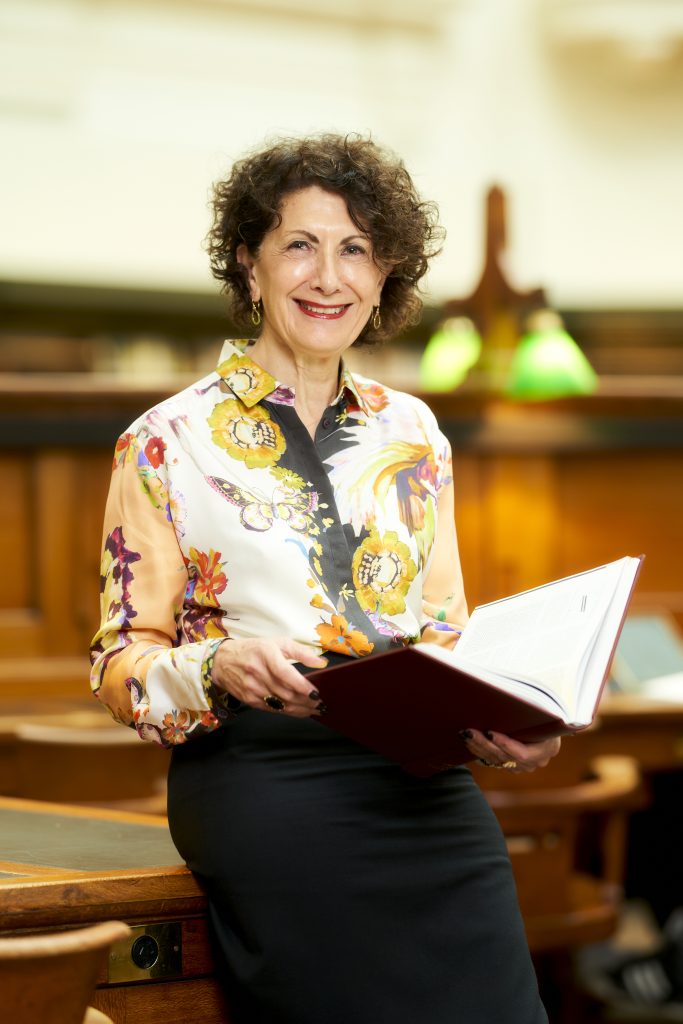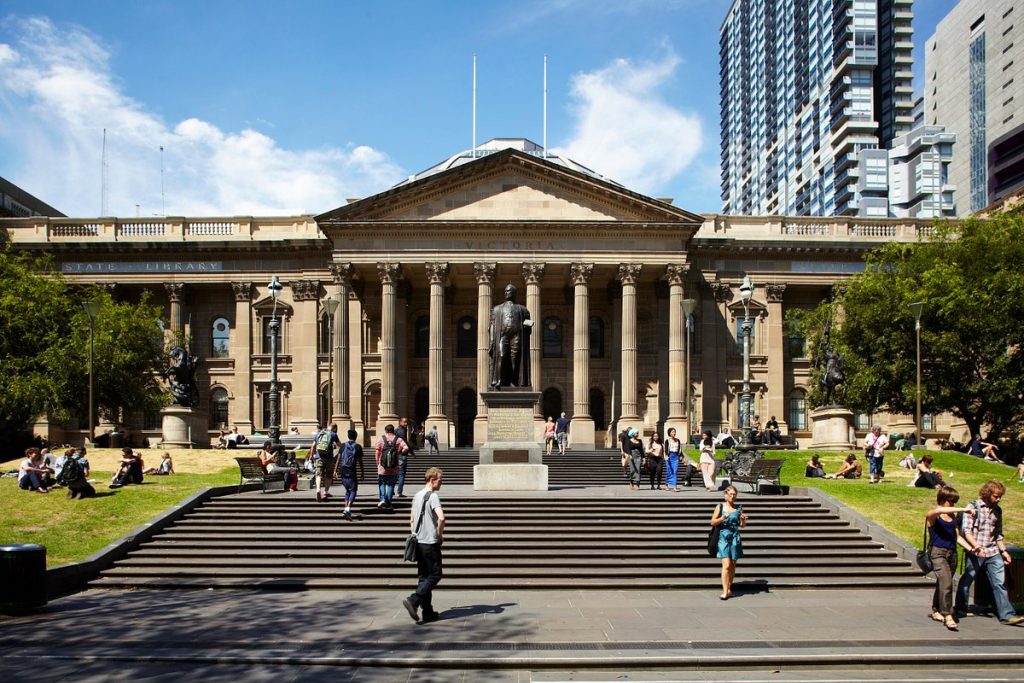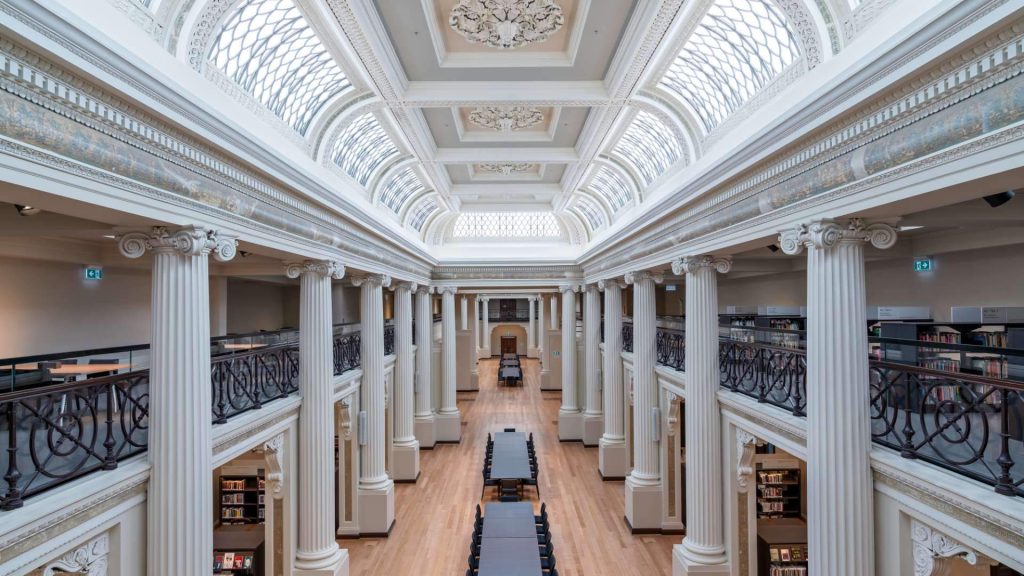With more than 37 years of experience in financial, investment, government, digital media and many other fields in Australia and overseas, the career of Christine Christian has been “quite a journey,” as she describes it herself.
Ms Christian was appointed Officer in the General Division of the Order of Australia in 2020 for her contribution to women in business, emerging entrepreneurs and for her services to the financial and investment sectors. In 2021, she became the first female President of the State Library of Victoria in its 165-year history.
The Greek Herald spoke with Ms Christian about her Greek heritage and the role of modern libraries today.
Tell us about your Greek heritage.
My mother is a proud Greek woman who always positions her faith and her homeland at the heart of her own identity.
Growing up, she would often share stories of ancient Greek folklore and lessons around their relevance to the world we live in today. I was left in no doubt which civilisation had given the world democracy, logic, theatre and the Olympic Games – how Greece led major innovations in mathematics, engineering, architecture and astronomy.
As I am half-Greek, I never felt I had the right to describe myself entirely as ‘Greek,’ but when I was taken back to Corinth to visit my mother’s ancestral home, I couldn’t help but feel part of something exceptional – a direct connection to a culture stretching back centuries.
Today, I feel fortunate to have had a direct grounding into the passage of my relatives – and to have some link to a community so rich in heritage and legacy.

How would you describe your working career in various fields over the last 37 years?
It’s been quite a journey so far and I have been fortunate. I’ve worked in a variety of sectors over the years – from financial services and private equity through to credit risk and digital media, and now the arts and cultural spaces. I can tell you that every day presents its own challenges, but at least I have always enjoyed the pace of change.
A number of executive and advisory roles have given me the chance to work all across Australia, China, the United States, India and New Zealand – while the chance to lead boards has let me be part of shaping organisations’ futures by driving growth and through significant corporate M&A transactions. It is this experience that I can now draw on as the Library Board of Victoria’s President and as a Council Member for La Trobe University. These jobs allow me to indulge my creative side, use more of the right side of the brain and get out of my comfort zone.
From a personal point of view, I’m most proud of having played a role in ‘firsts’ for Australian women – having been the first woman to lead a management buyout in Australia in 2001 and then being the first female appointed to the role of President of the Library Board of Victoria.
I’m a big believer in helping young people realise their potential and feel fortunate that I’m now in a position to help steer and challenge a number of them to pursue roles they might otherwise deem out of reach. That’s why I was so determined to support the StartSpace program at the State Library – to help kickstart the careers of the next generation of Victorian ‘go-getters.’
You are the first woman to be appointed to the position of President since the Library opened. How do you feel about that and what do you think of the situation today when it comes to women taking over leading, decision-making positions in Australia?
I am conscious that a library must reflect the community it represents, and as Victoria has grown and modernised so too has this institution. I look at the contribution of the men who proceeded me and have nothing but admiration and gratitude – but it is inescapable that they were all men. Much like the architecture through our unique public spaces or the breathtaking scope of our State Collection, that list tells a little of the story of our state’s journey.
It is a point of personal pride that I can be part of a twist in that journey, and I am under no doubt that fantastic women will follow me in this office and make exceptional contributions to State Library Victoria’s future over the years to come.
Through experience of being a woman in positions of influence across corporate Australia, what I believe most important is that we make the most of these opportunities and deliver the results that make such appointments routine and uncontroversial.
We are well on the way, and there is a wealth of excellent female leaders out there ready to take on challenging roles. The boulder is rolling, it’s momentum we need to continue to provide.
How do libraries have a major impact on society today? Are there ways to grow their influence further?
State Library Victoria was established in 1856 as ‘the People’s University’ – a free service built around the egalitarian principle that culture is a human right. The foresight of Sir Redmond Barry and his contemporaries was breathtaking. All those years ago, they were clear that the arts are not discretionary – the arts are what nourish a nation.
Today we look at libraries as catalysts for creativity, innovation and endeavour at the heart of a community’s efforts to enrich the lives of those around such institutions. If you ask people about State Library Victoria, many people will talk about the Dome, or our collection, or our buildings. But across Victoria, there are others who will talk about our role at the centre of a network of 281 public libraries delivering community health and wellbeing programs – critical social infrastructure that improves lives.
Are there ways to increase the influence of libraries? Certainly. Much of that will come through the adoption of technology and the opportunities that it will bring to speed up the exchange of information. We had a record year in terms of onsite visitation last year, but it was our website that saw a 60% increase in audience reach from the previous year.
The Government’s National Cultural Policy has promised new synergies, increased funding options and clear pathways forward for the arts and cultural sectors. That ambition, combined with game changers such as data aggregation and shared digital collections, means that libraries are entering a period of enormous opportunity.

Tell us about the State Library of Victoria and its role in Melbourne’s cultural community?
There are five million items held within State Library Victoria’s collection. Each one tells a little piece of Victoria’s story, a little piece of its journey.
The opportunities these treasures provide are endless – and it is incumbent on the Library to find new ways to use them to represent and reflect the lives of Victorians from every corner of our community. For example, our exhibition MIRROR: New views on photography showcases 141 photographs from within the State Collection, alongside new works by Victorian storytellers that tell fascinating tales of life through a contemporary lens.
The State Government charges this institution with nurturing a rich creative culture that underpins Victoria’s future resilience and prosperity. Melbourne is Australia’s cultural capital, a UNESCO City of Literature, and at the centre of the Education State.
To my eye, State Library Victoria sits at the heart of all that – the guardian of Victoria’s identity and the spark driving new and exciting innovation.
How important is it that libraries evolve their services to ensure they are compatible with technological (digitalisation) and social progress so that they remain an important part of people’s lives today?
The world is changing and advancements in tech are happening every day. The only way a 167-year-old institution such as State Library Victoria can stay relevant is by harnessing the power of the most potent developments. This is not a case of importance, this is essential.
We exist to deliver greater creative experiences to Victorians not just in Melbourne, but across regional and remote communities too. Technical innovation sits at the heart of the Library’s strategy to achieve that. Recently we hosted the first ever Book Bash, streaming Andy Griffiths and other children’s authors into classrooms around the state. We had 60,000 students participating over three days – many from regional Victoria.
Tech will broaden our accessibility, which is a central tenet of our strategic vision for the coming years. It will allow our visitors to experience the treasures within our collection in a whole new way and protect the most fragile materials within our collections so that they are preserved for future generations yet unborn.
Even some of the less fragile – and most famous – elements within our collection will be at the centre of this advance in how technology drives interaction, although I am not allowed to say anything more about that just yet.
What is your experience of your role in the library and are there challenges you have had to face and special moments that stand out for you?
If we are talking about my time as a member of the Library Board of Victoria, that stretches back to 2013. Personally, I believe there is a duty that rests on your shoulders when you are entrusted with responsibility for an institution like State Library Victoria.
It has served the people of Victoria through wars, several pandemics and many, many different governments. It has supported people from across the world as they study for their future and provided a safe haven for local residents who seek a welcoming place to gather and collaborate. It is also served by a team of motivated and passionate people who possess an expertise that is not replicable anywhere else in the world.
Ensuring everything is in place to protect each and every part of this institution is no small task, and it is a different type of pressure to being a CEO in a big company somewhere. Making sure the Library’s case for public funding is watertight takes care and effort. Balancing the needs of different community groups is precarious. But it is also energising and exciting – and that is what I enjoy most.
Two moments jump out at me as particularly notable – the first was when I first glanced into the Dome after being named President. It was then that the opportunity, and the challenge, really came home.
The second was when StartSpace first opened its doors. I was thrilled to have the chance to back a free support service for early-stage new business founders as it provided the type of help that I had lacked early in my own entrepreneurial career. In terms of driving progress and change, that meant a lot to me.

How much has COVID-19 affected the way libraries offer their services and the way people choose to use them?
Like every business and industry sector, the COVID-19 pandemic has proven a cause for a radical reassessment of the way libraries operate.
When the lockdowns forced the closure of our doors, we worked hard to strengthen our online offering, we launched an online ‘Ask a Librarian’ chat service, we rolled out more than 400 digital programs and content pieces and created a virtual tour of exhibitions to engage with those people unable to travel. We adapted – the key to State Library Victoria’s ongoing relevance over its years in existence.
What I have found most incredible is that there appears to have been a boom in demand for our services after the disruption that the pandemic caused. People are hungry for community interaction, and they have returned to us in record numbers.
This year marked the busiest year for the Library in 167 years, and we are looking to build on that every year moving forward. By 2026, we are targeting three million onsite visits. There are few libraries in the world that can aim at such targets.
Is Melbourne’s Greek community engaging with the Library and its activities? Do you think that there is space to improve this relationship?
There is certainly space to improve the way the Greek community engages with State Library Victoria. It is a library for all, and if I am not pushing for people to have a greater connection with the institution, I am not doing my job properly.
A library has to reflect and represent the people that form the society around it – and the State Library already has strong connections to the Greek community. Within the Library’s Genealogy Collection there are a wealth of materials and records reflecting Melbourne’s Greek population. For any Victorian Certificate of Education student wanting to learn more about Ancient Greece, our State Collection is one of the finest starting points available. Even our walls and the ceilings speak to ancient Greek architecture – with our recent Vision 2020 redevelopment project focusing great resources in restoring many of the Library’s finest ancient Greek inspired features.
This connection is being recognised not just at home, but across the world. Just a few weeks ago we hosted a Greek production company who were in Melbourne to film a documentary about migrants based in Australia from the island of Crete.
State Library Victoria has just come off the back of a record-breaking year in terms of drawing in visitors, and we have ambitious targets to continue to grow our reach and impact. To do this, we need to ramp up our relevance to all communities across Victoria. Any idea and opportunity to do this within Melbourne’s Greek community is one I would jump at the chance to deliver.
